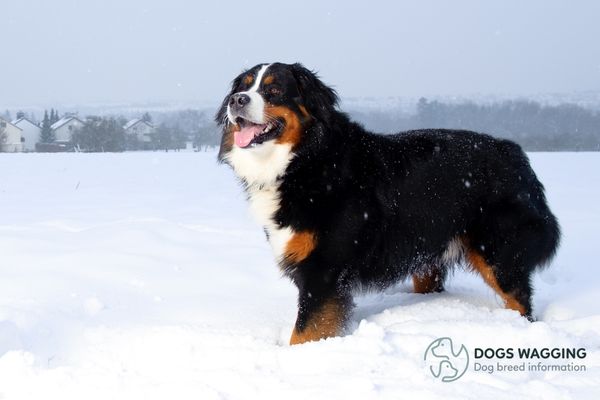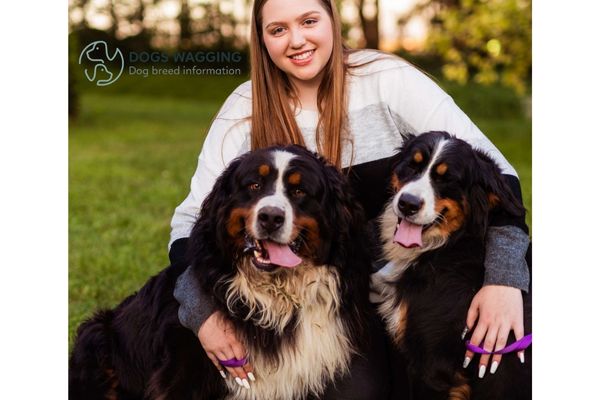John Switch • Sun Feb 25 2024
Bernese Mountain Dog Adoption: Everything You Need to Know

Adopting a Bernese Mountain Dog can be a rewarding experience. Still, you need to be well prepared both knowledgeably, mentally, and financially.
In this article, you can explore everything you need to know about Bernese Mountain Dog adoption, from the breed's traits to where to find a Bernese Mountain Dog for adoption, care concerns, cost, and more.
> READ MORE:
What to Consider for Bernese Mountain Dog Adoption
Bernese Mountain Dog History
The Bernese Mountain Dog, known for its gentle and affectionate nature, has a rich history as a working and family dog. These dogs originated in Switzerland around Berne, where they were bred for their versatility as farm dogs, herders, and loyal friends.
Berners came to America in the early 1900s and was recognized by the American Kennel Club in 1973. They are now one of the most popular dog breeds in the country, as evidenced by their 22nd ranking on the 2022 list of most popular dog breeds in the United States.
Appearance Traits
One of the first things that captivates potential adopters is Bernese Mountain Dogs' striking appearance. These dogs are large and robust; they can weigh from 70 to 115 pounds and grow from 23 to 28 inches tall.
They have distinctive thick tri-color coats consisting of black, rust, and white or black, tan, and white. Their sturdy build, expressive dark brown eyes, and friendly personality make them instantly recognizable and appealing.
Temperament Traits
Bernese Mountain Dogs are renowned for their friendly and loyal personality. They are affectionate and thrive on human companionship.
They are often described as "gentle giants" due to their size and gentle nature, making them excellent family pets. Their friendly disposition and willingness to please make them well-suited for families with children.
Living Needs
Before adopting a Bernese Mountain Dog, it's crucial to consider their living needs. These dogs are unsuitable for small apartments or homes with limited outdoor space. They require a spacious environment to move comfortably and receive enough exercise.
Moreover, Berners have thick coats, and they are best suited for colder climates.
Where to Find a Bernese Mountain Dog for Adoption
Adopting Dog Rescue Organizations
One of the most ethical ways to bring a Bernese Mountain Dog into your life is through breed-specific rescue organizations. These organizations are willing to rescue and rehome these dogs in need. They often have dogs of various ages and backgrounds available for adoption. Adopting from a rescue gives a deserving dog a second chance at a loving new home.
Adopting Public Animal Shelters and Humane Societies
Public animal shelters and humane societies occasionally have Bernese Mountain Dogs available for adoption. While they may be less common than in breed-specific rescues, adopting from a shelter can still provide a loving new home for a dog in need. You must check local shelters regularly and be patient in your search.
Buying from a Dog Breeder
Suppose adoption from a rescue or shelter is not feasible. In that case, another option is purchasing a Bernese Mountain Dog from a reputable breeder. However, it's crucial to exercise caution when choosing this route. Ensure that the breeder is responsible, adheres to ethical breeding practices, and prioritizes the health of the dogs. Ask for references and visit the breeder's facility to assess the dogs' living conditions.
Care Tips for Bernese Mountain Dog Adoption
Grooming
One aspect of Bernese Mountain Dog ownership that requires attention is grooming, which keeps them looking their best and contributes to their overall well-being.
These dogs have a dense double coat and shed a lot, especially in the spring and fall. Therefore, you must brush your dog daily to remove loose hair and prevent mats and tangles. Regular grooming also helps reduce shedding and stimulate new hair growth.
You should bathe your dogs about once a month and bite their nails once a month. Also, check and clean your dog's ears weekly. When their ears are red or swollen, or there is odor in the ears, take them to the vet for a medical examination, as they may have an ear infection.
Finally, brush your Berner's teeth regularly to prevent tartar buildup that can lead to gum disease.
Food & Diet
Providing a balanced and high-quality diet is necessary for your pet's health. You should consult with the veterinarian to determine the appropriate diet based on their age, activity level, and specific dietary needs.
Avoid feeding them freely, as they can become fat. Additionally, you must ensure that clean, fresh water is always available to them. Proper nutrition is crucial to maintain their strength and vitality.
Exercise
Berners have moderate energy levels and require a minimum of 30 minutes of moderate-intensity exercise each day. You can take them for walks, hikes, play fetch, or go to the dog park. They are hardy, so you let them participate in dog sports, such as obedience, agility, tracking, cartwheeling, etc.
These activities can keep them mentally and physically engaged. Failing to provide enough exercise can lead to boredom and potential behavioral problems.
Training
Training is an important part of Bernese Mountain Dog ownership. These dogs are intelligent and eager to please, making them receptive to training. Positive reinforcement methods, such as treats and praise, effectively teach them commands and desirable behavior.
Moreover, consistent and patient training sessions will help your Bernese Mountain Dog become a well-behaved companion.
Common Health Problems
Like all breeds, Bernese Mountain Dogs can be prone to certain health issues inherited from their parents or caused by environmental factors. Some of the common health problems that may affect them include:
- Hip and Elbow Dysplasia
- Bloat
- Blood disorders - Von Willebrand's disease
- Progressive retinal atrophy
- Cancer
Regular veterinary check-ups and a proactive approach to their health are necessary to address these concerns.
Health Certifications
Responsible breeders and rescue organizations typically provide health certifications for Bernese Mountain Dogs. These certifications may include:
- Hip and Elbow Evaluations
- Cardiac Evaluations
- Genetic Testing
Ensuring these certifications are in place can help you adopt a healthier dog.
Bernese Mountain Dog Adoption Cost
If you’re looking for a Bernese Mountain Dog puppy to adopt, you can pay from $2000 to $3000. This price may vary depending on factors such as size, weight, color, health status, location, number of breeders, etc.
FAQ - Bernese Mountain Dog Adoption
Why Shouldn't You Adopt Bernese Mountain Dogs?
While Bernese Mountain Dogs are wonderful friends, they may not be the right fit for everyone. Reasons why you might reconsider adopting one include:
- Size: Their large size may not be suitable for small living spaces.
- Exercise Needs: They require regular exercise, which may be challenging for people with limited mobility.
- Grooming: The grooming needs of Bernese Mountain Dogs can be demanding.
- Health Concerns: They are prone to specific health issues, which can result in significant veterinary expenses.
Why Are These Dogs So Expensive?
The adoption fee or purchase price of Bernese Mountain Dogs can be relatively high due to various factors:
- Breed Characteristics: Bernese Mountain Dogs are a purebred breed with unique traits that can increase their value.
- Breeder Costs: Reputable breeders invest in the health and health of their dogs, which can lead to higher breeding costs.
- Demand: The breed's popularity can increase the price as more people seek to adopt or buy it.
- Health Care: The cost of vaccinations, spaying or neutering, and other health care expenses is included in the adoption fee.
Conclusion
This complete guide covers all aspects of Bernese Mountain Dog adoption, from breed traits to the adoption process, care tips, costs, and frequently asked questions. Feel free to use and customize this content for your adoption-related purposes.

John Switch / Author
Hello this is a test author
Recent blog posts

John Switch • Fri Dec 29 2023
American Corgi: All Facts You Need to Know
An American Corgi are a mixed dog which is result of crossing two different breeds: the Cardigan and the Pembroke Welsh. Let's explore the allure of the Am

John Switch • Fri Dec 29 2023
Plott Hound Pitbull Mix: Everything You Need To Know
Are you in search of a unique and loyal companion? Look no further than the Plott Hound Pitbull mix. This nice hybrid breed combines the best traits of the

John Switch • Tue Jan 09 2024
Decoding The Charm Of Pit Bull Poodle Mix Breeds
Are you searching for a unique and charming canine friend? Look no further than the Pit Bull Poodle mix, also known as the Boodle. This fascinating mix comb

John Switch • Thu Jan 04 2024
Corgi Bulldog Mix: Dog Breed Information And Pictures
The Corgi Bulldog Mix, a charming hybrid breed, combines the distinctive features of the purebred Corgi and the English Bulldog. This dog breed is also know
 The Bernese Mountain Dog
The Bernese Mountain Dog The Bernese Mountain Dog for adoption
The Bernese Mountain Dog for adoption Bernese Mountain Dog puppies for adoption
Bernese Mountain Dog puppies for adoption Bernese Mountain Dog adoption and training
Bernese Mountain Dog adoption and training